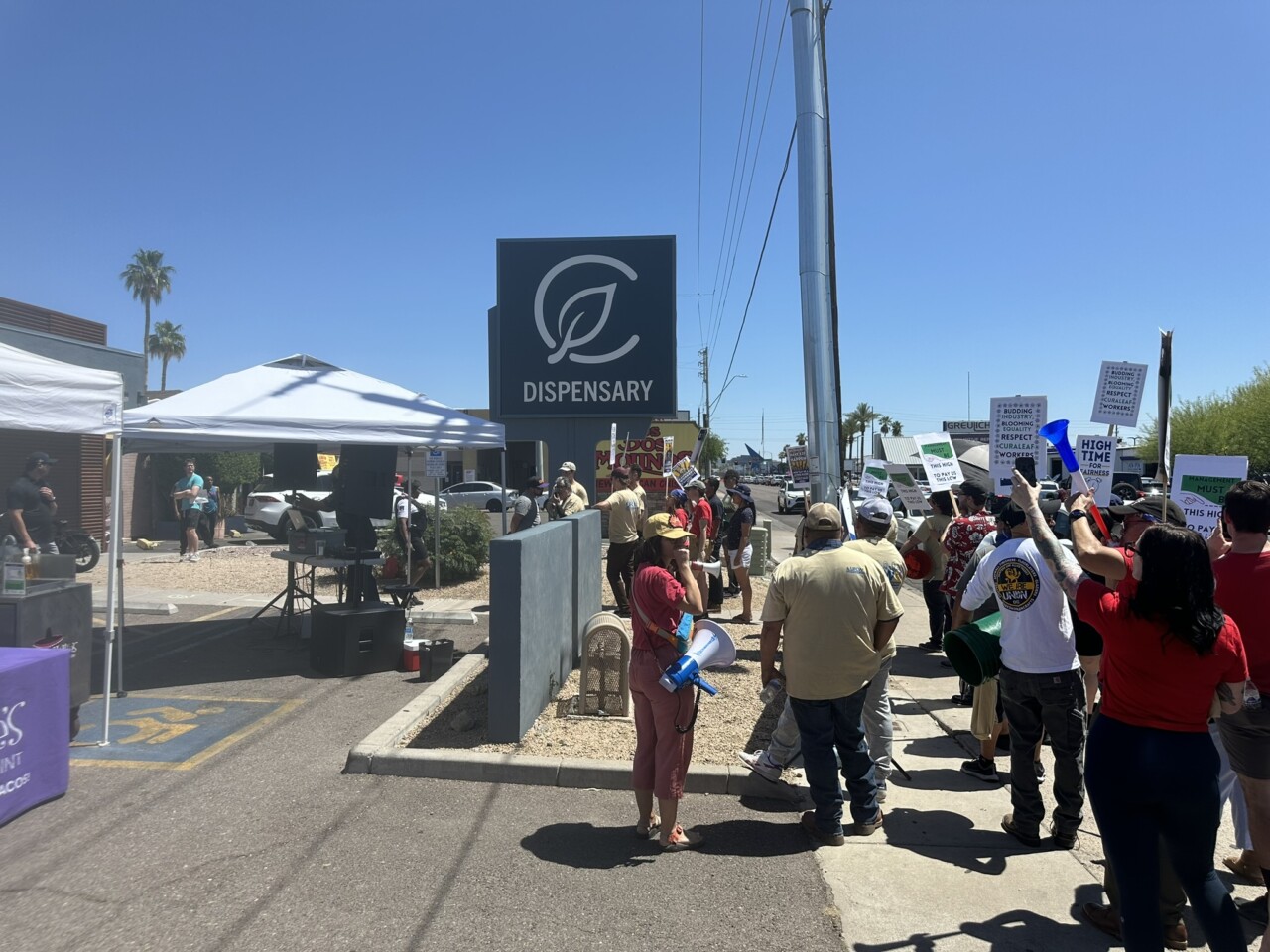Take Action: Read & Learn
01/18/2018
Arizona NORML presents the Arizona Legislature Cannabis Bill Report Week 2
By week two at the AZ state legislature 15 cannabis related bills have been filed and at least three more are on their way. The positive bills include 3 different attempts to lower patient card costs, a bill to stop Jeff Sessions from interfering with the state program and another attempt to address AZ’s harsh possession laws for non-card holders. Negative bills include two bills to hamper legalization initiatives, two attempts to grab unspent funds from the medical marijuana program to pay for law enforcement to target cannabis users, two proposed changes to state DUI laws, and two different approaches to limit cannabis marketing, among others.
The most-timely pro-cannabis bill so far this session, is by longtime cannabis reformer and social justice warrior, Rep Mark Cardenas (D-LD19). Cardenas’ HB2144 is a ‘hands off our state industry” bill, similar to legislation filed last year and this year in cannabis producing states like California, Oregon and Colorado. This bill was created in conjunction with AZ-NORML, the Arizona Marijuana Industry Trade Association, and the Arizona Cannabis Bar Association. It is one of three cannabis friendly bills Cardenas has already filed this session.
Cardenas’ HB2014 is the latest version of the representative’s efforts to pass a decriminalization bill. Cardenas has introduced various versions of this bill for the past four sessions. This round, possessing less than one ounce would be reduced to a $100 fine. Currently in AZ, any cannabis possession can be charged as a felony. Ironically, this bill was first introduced in 2014 and is now called HB2014. So far, five Republican legislators have voiced support for the bill, the most public GOP support a decriminalization bill has received in recent memory.
Lastly, Cardenas’ HB2147 takes on the high price of AZ medical cards and slashes the card cost from $150 down to a mere $15. In addition, at press time, Cardenas is working with Republican legislator, Todd Clodfelter (R-LD10), on an as-of-yet undisclosed piece of cannabis legislation.
Another returning champion of marijuana reform is Rep Pam Powers-Hannely (D-LD9). Powers-Hannley has two bills filed and another on the way. Her bill, HB2100 would address the high AZ patient card cost by extending a card from one year to five. Hannely filed similar legislation in the 2017 session. A friend of AZ-NORML and a medical card holder, Hannely is the former head of the state’s Democratic Progressive Caucus and medical journal editor.
Powers-Hannely also has filed HB2199 to lower card costs from $150 to $50. In addition, the Tucson representative is working with AZ-NORML on language for a bill to clarify legal protections for cannabis concentrates.
Last session, Sen Sonny Borrelli (R-LD5) successfully managed to navigate his way through the notorious anti-anything cannabis AZ Lege’ with a hemp bill only to have it struck down when it reached the governor’s desk. This year, SB1098 is Borrelli’s 2nd try at creating a state hemp program through the Dept. of Ag. Borrelli’s 2017 version of this bill gained national attention when it cleared both the Senate and the House near-unanimously only to be vetoed by the governor. Ag Sec. Mark Killian called for the veto over funding issues for launching the pilot program. This round Borrelli has smoothed out the funding issues and expects early support.
More significantly, after more than seven months of stakeholder meetings with advocates, patients and industry leaders, this session Borrelli is attempting the make significant changes in the state medical program. At press time (10pm Jan. 17, 2018), the long-awaited bill is still in draft stage, but a few key issues have been determined. First the state will shift regulation of the production of cannabis to the Dept. of Agriculture and cannabis will be deemed an “agricultural product.” Two, all cannabis products will be tested for health, safety and potency and sold in child-proof packaging. Additionally, the bill allows for dispensary operations to only purchase one “dispensary agent” license per employee. Currently agents are required to have separate cards for each facility where they work. Most importantly the bill hopes to lower patient card costs. Unlike the hemp bill, this regulatory package will be required to pass by 3/4s vote in both the House and Senate since it is modifying a law created by voter initiative.
On the negative side, as usual, the strongly conservative AZ state legislature has introduced far more bills attacking the state’s medical program than improving it. A returning foe of cannabis reform, Rep Vince Leach (R-LD11), has filed six bills that attack the state’s medical marijuana program and two to block future pro-cannabis citizens’ initiatives from being filed. HB2063 declares any active or inactive metabolite of any controlled substance, including cannabis, or prescription drug, not prescribed to the driver is evidence of DUI. In this case though inactive metabolites cannot prove actual impairment, they would still be evidence of prior possession and that would be enough to charge a driver, even a medical card holder, with DUI.
HB2064 prohibits cannabis product, packaging and marketing designs that might be construed as intended to appeal to children.
Leach’s HB2066 dips into the state’s $38million dollar MMJ fund to pay for enforcement, education and prevention awareness to reduce the number of patients accessing the program. Since the state’s medical marijuana program has mushroomed to be the 1/3 largest in the country, now at 150,000, (generating $19 million in local sales taxes in 2016), preventing new patients from joining is counter-productive.
HB2067 targets the state’s medical card certification clinics by making “knowingly or intentionally” approving unqualified medical card patients a class 6 felony.
HB2068 declares that drivers convicted of cannabis DUI may have their medical card rights suspended while on probation.
Leach’s HCR2008 would disqualify any citizens’ initiatives that violate federal law. This idea has been tried before in recent sessions and failed to clear committee. Though it is not guaranteed to be DOA, this week, the bill was pulled from its initial committee hearing.
His other initiative-focused bill is HB2284. This bill would make it harder for citizens to file initiatives challenging new state laws and require that any initiative’s campaign file monthly campaign finance reports, instead of the usual quarterly reports. It is worth noting in talks with state legislators from both parties (all of whom have been candidates themselves), the monthly reporting requirement has been roundly condemned as outrageous and excessive.
In the Senate, anti-cannabis Sen. David Farnsworth (R-LD16) has three bills targeting the industry. The bill garnering the most attention is SB1032, which prohibits cannabis outdoor advertising along highways.
Farnsworth’s two other bills were initially intended to be one bill. SB1060 targets the state’s emerging cannabis delivery industry and makes publishing erroneous information about the address or products of a dispensary a class six felony. After meeting with AZ-NORML, Senator Farnsworth assures that this bill is expected to face substantial revisions. Current wording targets companies like Leafly or AZMarijuana.com instead of unscrupulous delivery companies themselves.
Farnsworth’s SB1061 was originally a second part of the SB1060, which addressed funding for the crackdown on delivery drivers. Farnsworth is calling for five million dollars from the state’s medical marijuana fund to pay for the crackdown.
Donate to Arizona NORML. Help us keep these important updates coming.








Leave A Comment
You must be logged in to post a comment.